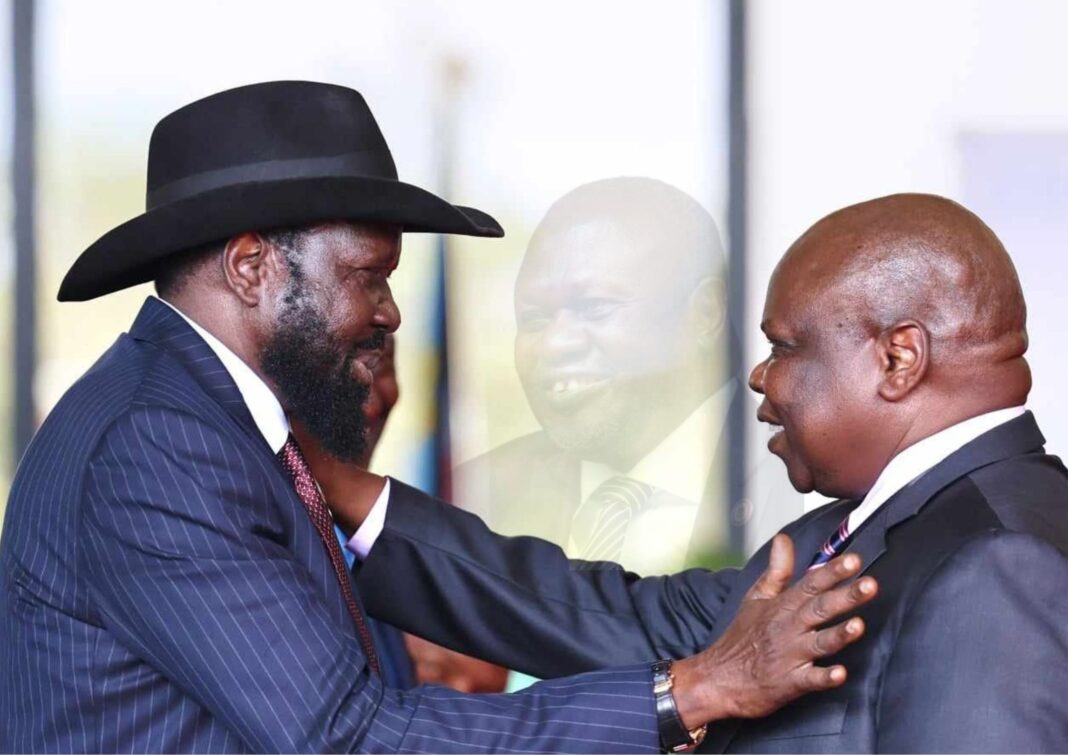President Kiir and Pagan Amum shaking hands as peace partners
By Samuel Vincent, GT contributor in South Sudan
South Sudan’s First Vice President Dr. Riek Machar Teny, who is also the chairman of Sudan People’s Liberation Movement In-Opposition (SPLM-IO) expressed concerns over the document shared by the mediators of the High-Level Mediation of the peace talks between the government and holdout groups in Nairobi, Kenya.
In a letter extended to Golden Times on June 19, Riek Machar, who is one of the principals of the Revitalized Agreement on the Resolution of Conflict in the Republic of South Sudan (R-ARCSS), fears the draft document titled “Tumaini Consensus and Implementation Framework for a Permanent Constitution and Sustainable Peace for South Sudan” substitutes the peace agreement which able to silence guns in most parts of the country.
Machar said the document does not recognize the R-ARCSS, citing that some sections establish alternative institutions replacing or running in parallel with those in R-ARCSS besides repeating most provisions in R-ARCSS or existing national laws of the land.
“The Tumaini Initiative has no power to amend the R-ARCSS. It is the parties signatory to R-ARCSS, acting together, which is the only body that has the power to initiate amendment of the R-ARCSS,” Machar said in a statement.
“The document has empowered the Tumaini Initiative to be one of the institutions rather than being a mediation forum. The outcome of the Tumaini Initiative clearly abrogates the R-ARCSS when it was intended to complement the R-ARCSS by ensuring the inclusion of the non-signatories (holdout group) in the implementation of the R-ARCSS. Therefore, the Tumaini Initiative has deviated from its intended mandate,” the statement read.
The holdout groups currently negotiating with the unity government in Nairobi defended the Tumaini Initiative, saying, the purpose of the negotiation was to address the root causes of the conflict by developing a coherent and concrete ‘Rescue Plan” for South Sudan.
In a letter equally extended to Golden Times, the leaders of the holdout groups said they had no intention to abrogate or hinder the implementation of the R-ARCSS.
“We are here to discuss a Rescue Plan for South Sudan, particularly given the failure of implementation of the R-ARCSS by its principal signatories in the last six years in addition to the three years failures of R-ARCSS, making a total of nine years loss,” the statement partly read.
The holdout groups said the Rescue Plan may include, among others, aspects of unimplemented provisions and programs of the R-ARCSS.
“We, therefore, appeal to the R-TGONU (Revitalized-Transitional Government of National Unity) parties in their extended transition to cease and desist from squabbles over the R-ARCSS and the persistent attempts to protect positions in the R-TGONU,” the statement read.
In the position paper, the holdout groups envisioned in the Rescue Plan the trust and confidence-building measures, security sector transformation and reforms, carrying out national healing, truth and reconciliation programs among others, as the maintain targets of the Tumaini Initiative for Peace in South Sudan.
In 2013, South Sudan descended to conflict after President Salva Kiir, and Riek Machar who was then the vice president clashed over the internal party affairs.
However, President Kiir and his affiliates accused Riek Machar and some party cadres believed to be siding with him of planning a coup against him.
Firstly, the enmity was limited to fighting between loyal and mutinous soldiers, the conflict soon developed into a civilian massacre and destruction of property.
In 2015, a peace agreement was signed and a year later, another conflict erupted and again resulted in the massacre of thousands of civilians and mass displacement.
In 2018, another peace agreement was signed and dubbed R-ARCSS which brought relative stability in most parts of the country, though, some other key opposition groups including National Salvation Front (NAS) and SPLM-Real among others abstained from signing the deal citing it lacks guarantees for settling the root causes of the conflict.
In 2019, the plight of the citizens of South Sudan caught Pope Francis’s attention triggering the initiation of the Sante Egidio Peace Initiative. Even with Pope Francis kissing of feet of South Sudan’s rival leaders, sustainable peace could not be attained.
However, the Tumaini Initiative is currently regarded as a continuation of the Sante Egidio Peace Initiative, yet again, it is drawing wider criticisms mainly from South Sudanese in the diasporas.
Golden Times | South Sudan




